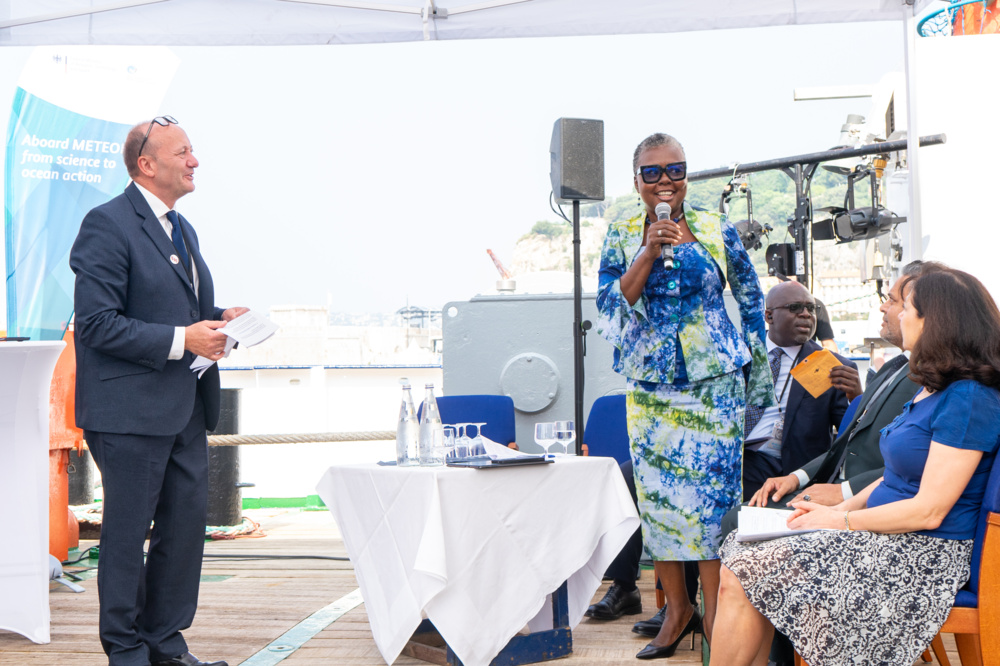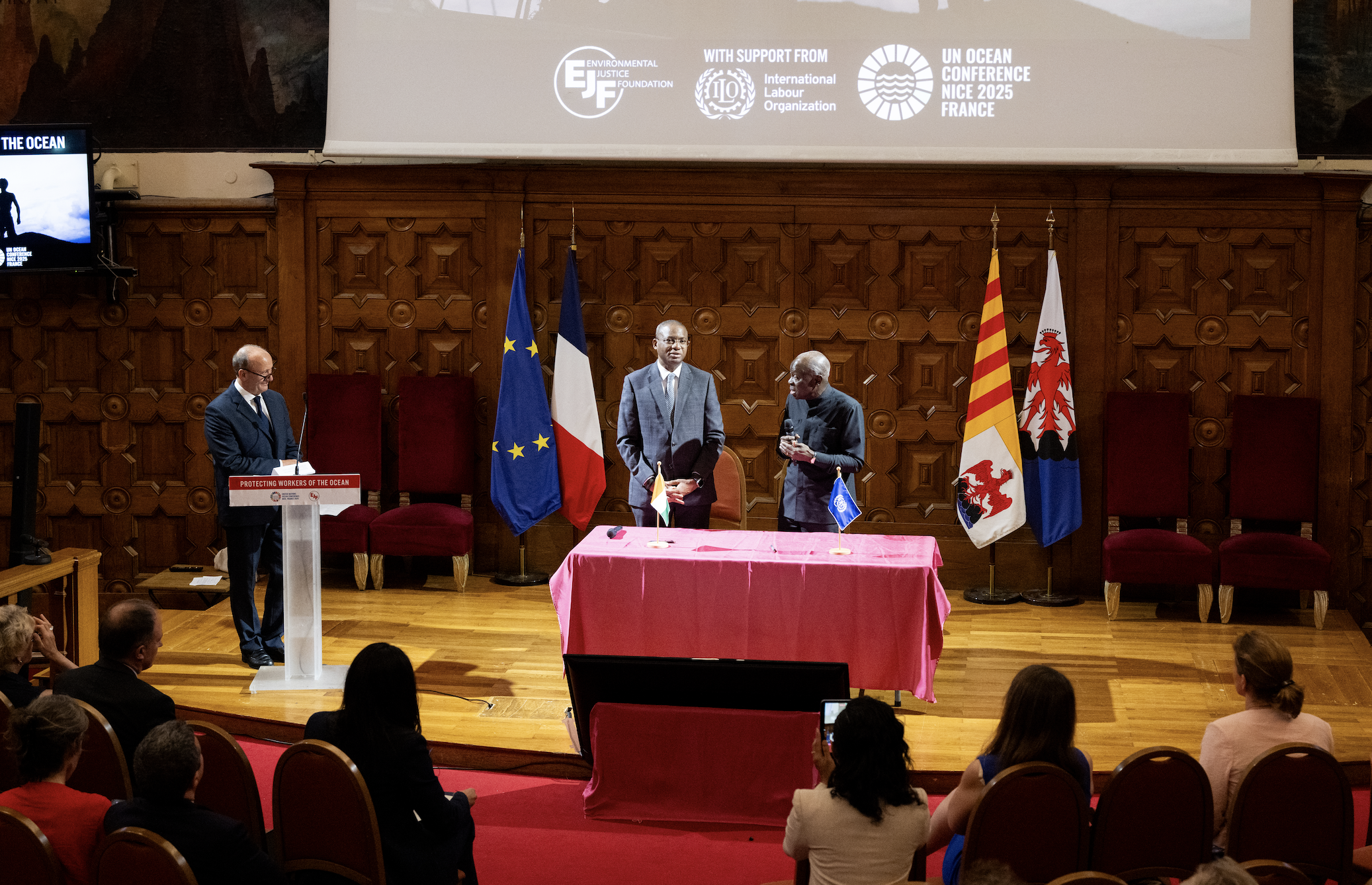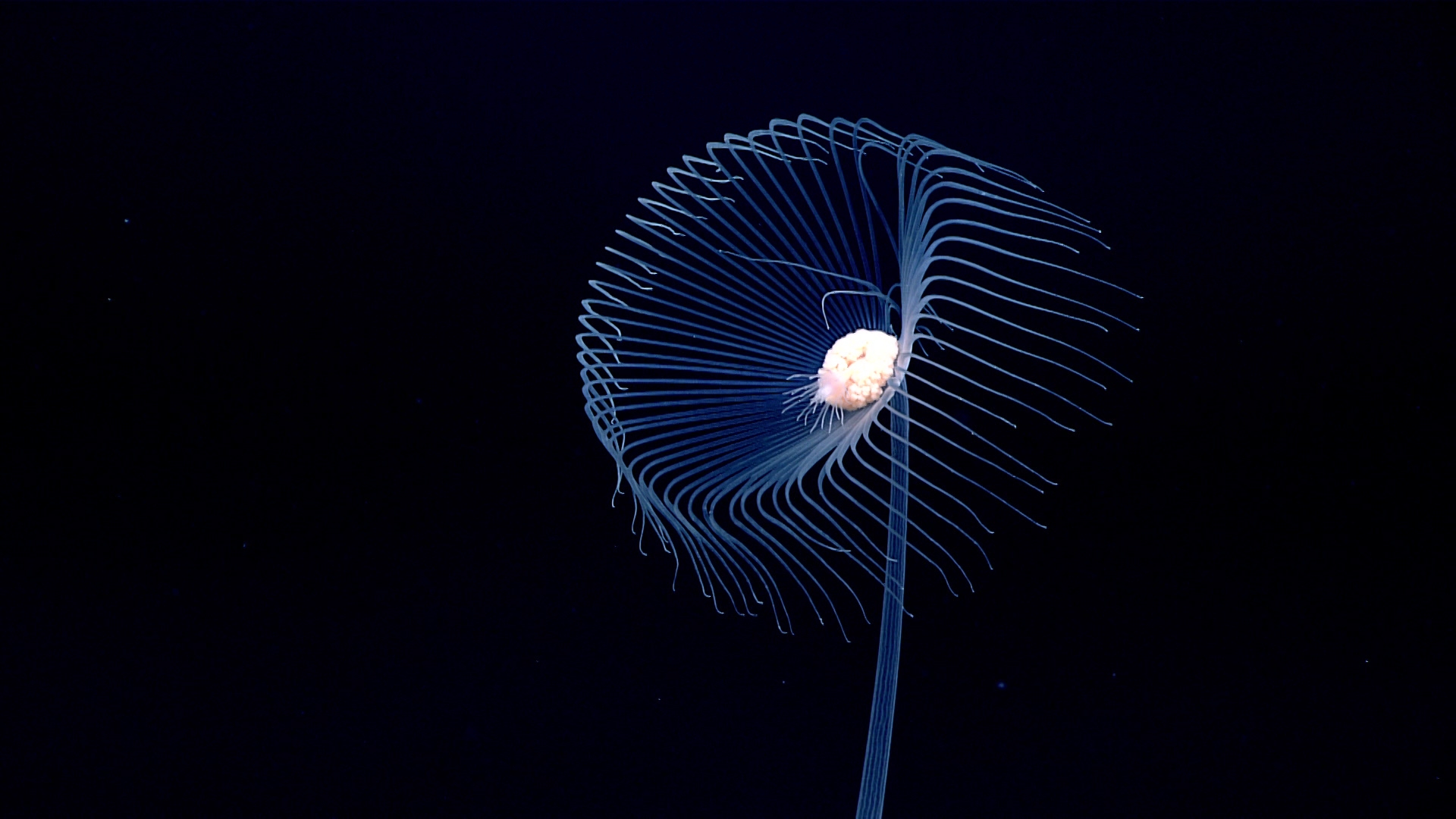
Senior ministers pledge action against hidden owners of criminal vessels: press release
UN Ocean Conference, Nice, France, 10 June 2025
For immediate release
Today, at a UN Ocean Conference event hosted by the Environmental Justice Foundation (EJF), senior ministers from several nations announced strong commitments to revealing who ultimately profits from the activities of fishing vessels. This is a critical step towards ending illegal fishing, human rights abuses and other crimes at sea, says EJF.
Fishing vessels are increasingly used to facilitate illegal fishing, forced, bonded and slave labour, and the trafficking of people, drugs, and wildlife. However, the individuals ultimately profiting from their activities remain hidden behind opaque ownership structures, shell corporations, and complex financial secrecy arrangements.
Today’s statements at UNOC, made by representatives from France, Ghana, Maldives, Liberia, Panama and the European Commission, highlight the central importance of unmasking beneficial owners to stop transnational crimes at sea, says EJF.
The Honourable Emelia Arthur, Minister for Fisheries and Aquaculture, of the Republic of Ghana, said: “The ocean has become a space where illegality thrives unchecked, and the true perpetrators often remain hidden. That is why beneficial ownership transparency, knowing who actually controls and benefits from a vessel or company, is essential. Without it, enforcement is a guessing game. With it, we can follow the money, close loopholes, and hold the right people accountable.”
“There can be no safe harbour for those who profit from crimes at sea, not in our ports, not in our markets, not in our financial systems. Protecting the ocean requires us to expose those who exploit it from afar. It's time we brought the true beneficiaries of maritime crime into the light, and Ghana stands ready to do so.”
His Excellency Ahmed Shiyam, Minister of Fisheries and Ocean Resources of the Republic of Maldives, said: “We believe that reliable, accessible, and well-managed data is the most powerful tool in our arsenal. That's why Maldives is committed to ensuring that all licensed vessels are associated with its beneficial ownership information, and this information is made publicly accessible in line with international best practices.”
“However, real impact begins at home. Strong national commitments must be the foundation of global progress towards eliminating illegal, unreported and unregulated fishing and other transnational crimes at sea. Maldives believes that when coastal nations take ownership of the problem and lead by example, global change becomes not just possible but inevitable.”
Ms. Charlina Vitcheva, Director-General for Maritime Affairs and Fisheries, European Commission, said: “Transparency is something that we support in everything we are doing. Beneficial ownership of IUU-listed vessels is mentioned specifically in our legislation as part of IUU fishing activities. If we want to battle beneficial ownership, we have to be able to close all the loopholes. Traceability is the best of transparency.”
Mr Éric Banel, Director General for Maritime Affairs, Fisheries and Aquaculture of the French Republic, speaking about beneficial ownership transparency and the Port State Measures Agreement (PSMA), which aims to prevent vessels engaged in illegal fishing from using ports and landing their catches, said: “This is a vital subject. We have to make improvements on flag states and ownership. We need to scale up as other European Member States, but also other member states around the world, within the PSMA framework. We really want to begin the process of systematically identifying beneficial owners from each Member State of the PSMA Agreement, but also each state fishing in the world. We have to put in place a global framework for data sharing on this. This is something I want to insist upon.”
Honourable Neto Zarzar Lighe, Sr., Commissioner, Liberia Maritime Authority, said: “Our resolve to end IUU fishing and bring greater transparency to our ocean governance system remains steadfast. Consistent with this commitment, the government of Liberia proudly endorses the Global Charter for Fisheries Transparency.”
“We remain committed to working with regional and international partners to ensure that beneficial ownership information is fully accessible, so that those truly responsible for illegal fishing operations are held accountable. Liberia will not serve as a safe harbour for illegal fishing activities moving forward. Liberia pledges to continue leading the regional charge against illegal fishing and to promote robust fisheries transparency.”
Mr Gerardo Irimia, the Deputy Administrator of the Aquatic Resources Authority of the Republic of Panama, said: “Panama has also recognised the critical importance of transparency in the fisheries sector. We have enacted new legislation requiring the declaration of the ultimate beneficial owners for all international vessels under our flag. Without beneficial ownership information, enforcement efforts can often penalise vessel operators or vessel owners while the real beneficiaries remain hidden and unaccountable.”
“Transparency and beneficial ownership information ensure the vessels engaged in illegal, unreported and undeclared fishing are identified and addressed effectively.”
Steve Trent, CEO and Founder of the Environmental Justice Foundation, said: “Transparency in beneficial ownership is the leveraging of justice, sustainability and security. It empowers coastal states to enforce their laws; it protects honest fishers from unfair competition, and it gives consumers the confidence that the fish they eat was not caught illegally and unsustainably, stolen from coastal communities or fished by forced, bonded or slave labour. “
ENDS
Notes to editors
About EJF
Our work to secure environmental justice aims to protect our global climate, ocean, forests, wetlands, wildlife and defend the fundamental human right to a secure natural environment, recognising that all other rights are contingent on this. EJF works internationally to inform policy and drive systemic, durable reforms to protect our environment and defend human rights. We investigate and expose abuses and support environmental defenders, Indigenous peoples, communities, and independent journalists on the frontlines of environmental injustice. Our campaigns aim to secure peaceful, equitable and sustainable futures. Our investigators, researchers, filmmakers, and campaigners work with grassroots partners and environmental defenders across the globe.
For more information or to organise an interview with one of our team present at UNOC, please contact media@ejfoundation.org.
Photo credit: Franz Mahr/OCEANA
SIGN UP FOR OUR EMAILS AND STAY UP TO DATE WITH EJF

